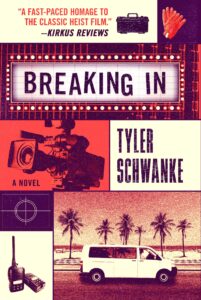“It’s important to know your genre if you’re going to make an impact on it,” says Millie Blomquist, the protagonist of my debut novel, Breaking In, a story in which Millie leads a group of film students to pull off a real life heist by utilizing what she learned from the movies. Her knowledge stems from having watched and documented over 150 heist movies, which meant I got to watch and document over 150 heist movies (though to be honest, Millie is much more discipled than I am as I stopped taking notes after movie #102).
To fully submerge myself in the genre, I started back when heist films were fully steeped in black and white noir. Working my way through the years, I discovered movies I’d never heard of that were equal, if not better, than the movies that adorned everybody’s best heist movie list. That doesn’t mean the classics don’t deserve their distinction. Danny Ocean will always be considered the coolest Mastermind, and nobody will ever film anything as suspenseful as Rififi’s 32 minute heist sequence without a stitch of dialogue or music, but here are seven overlooked and forgotten heist movies that deserve another watch.
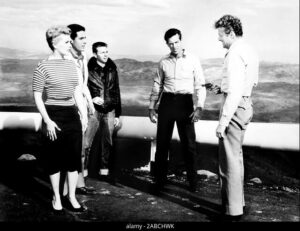
5 Against the House (1955)
While planning and executing a robbery had been an element of crime movies since the invention of cinema, it wasn’t until John Huston’s The Asphalt Jungle (1950) centered an entire movie around the concept that the heist genre was born. Staples of the decade include such classics as The Killing and Rififi, but one overlooked gem is 5 Against the House, a black and white picture about four Korean War vets and a cabaret singer that try to rob a casino five years before Frank Sinatra would in the original Ocean’s Eleven. Starring a pre-Hitchcock Kim Novak, the film veers away from hard-boiled gangster archetypes and presents the crew as young and naïve, the heist starting off as a college prank with no intention of keeping the money. It’s when the film explores themes of PTSD and mental health that audience learns there’s more going on with these war vets than meets the eye, leading to a third act filled with double crosses and friendships pushed to the brink.
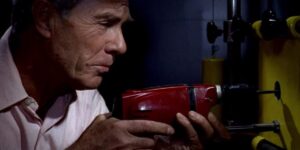
Grand Slam (1967)
By the 1960s, heist movies—as well as the rest of Hollywood—had done away with black and white film and were shooting vibrant Technicolor pictures featuring exotic locales. No better example of the era is Grand Slam, a diamond heist set during Carnival in Rio de Janeiro. With a swinging score by legendary composer Ennio Morricone (The Good, the Bad and the Ugly) and starring a post-Hitchcock Janet Leigh (I’m not doing this on purpose, I swear) the film centers on four complete strangers, each with their own unique special talents, brought together to crack a safe that’s designed to be uncrackable. While planning the heist comes with its own challenges, it’s the heist’s execution that keeps the audience white-knuckling it while watching from the edge of their seats. From dangling six-stories high above a Carnival parade, to side-stepping invisible lasers cutting through the vault, to a twist ending that’ll have you hitting rewind the second the credits role, there’s a reason why Roger Ebert called Grand Slam “one of the best heist movies.”
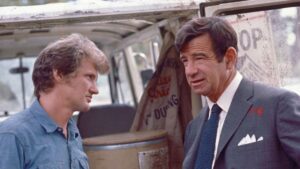
Charley Varrick (1973)
When it comes to Walter Matthau, most people remember him for his collaborations with Jack Lemmon in fan favorites like The Odd Couple and Grumpy Old Men or as the drunk little league coach in Bad News Bears. For me, I always associate him with two heist movies, the first being the excellent The Talking of Pelham One Two Three. The second is the vastly unappreciated Charley Varrick, where Matthau plays the title character, a down on his luck crop duster who tries robbing a small town bank. The film opens on the heist, which is technically a success since they get away with $750k, though two members of the crew end up getting shot and killed, one of them being Charley’s wife. To make matters worse, the money stolen is from a mob bank, meaning hard prison time is best-case-scenario, as the Mafia will stop at nothing to kill the people who ripped them off. The film is gritty and tense with plenty surprises, and features one of Matthau’s most dramatic performances, showcasing how versatile of an actor he really was.

The Lookout (2007)
Taking a bank has become the quintessential target for heist movies, stretching all the way from Bonnie and Clyde (1967) to Heat (1995) to Hell or High Water (2016). And while there’s something riveting and terrifying about a person doing their best John Dillinger imitation, at times movie bank robberies can become predictable, which is why it’s so refreshing when someone tries a new spin on the genre. Case in point, Scott Frank, screenwriter of Get Shorty and Out of Sight (both excellent adaptations of excellent Elmore Leonard novels) makes his directing debut with The Lookout, a slow-burn of a movie set around a night janitor in a small-town bank in nowhere Kansas. Joseph Gordon-Levitt stars as Chris Pratt (not that one), a former promising hockey player who suffers a brain injury following a tragic car accident that causes him to forget things. Frustrated and angry with his place in the world, Chris is tempted by a con man who promises a better life, and agrees to help rob the bank where he works. Filled with suspense, riveting performances, and a great twist of an ending, The Lookout begs to ask the question: how do you manipulate someone’s mind who already manipulates itself?
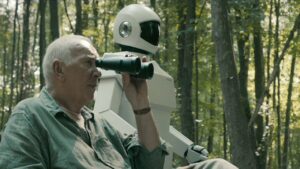
Robot & Frank (2012)
Set in the near future, Frank, an elderly former cat burglar suffering from dementia, is gifted a home health care robot to take care of cleaning his house, cooking his meals, and helping improve his cognitive skills. One of the ways to do this is to have Frank work on a project. The robot suggests gardening. Frank chooses to teach the robot how to pick locks. Soon, Frank is back to his old ways, having turned his robot butler into a partner in crime, who assists him in pulling off a series of capers. Featuring a stellar performance by Frank Langella as Frank and Peter Sarsgaard as the voice of the Robot, Robot & Frank is more than your average heist flick. It’s a poignant film about facing life’s regrets and asking for help from the unlikeliest of places.
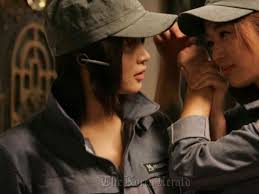
The Thieves (2012)
For those seeking action-oriented heists with plenty of twists and turns, I highly recommend The Thieves, a South Korean Ocean’s Eleven meets The Departed with stunt-heavy set pieces that rival anything found in a Jason Bourne movie. While it’s the second highest grossing film of all time at the Korean box office, it’s received little attention in the states outside of cinephiles who know to go looking for it (this is you now, go find it!). The film centers around two heist crews—one from South Korea, the other from Hong Kong, who, surprise, surprise, don’t get along—that join up to pull off one big job, a diamond heist in a casino. Going into the heist the audience will have chosen sides and picked their favorite crew members. That is until the double crosses start, and once they start flying make sure you’re reading the subtitles carefully as your allegiance to each character will be challenged right up until the film’s final minutes.
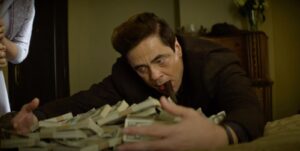
No Sudden Move (2021)
A heist list without mention of Steven Soderbergh is like trying to bake a cake without adding flour—nice try, but you’re missing a key ingredient. Director of The Underneath, Out of Sight, Ocean’s Eleven, Twelve, Thirteen, Logan Lucky, and No Sudden Move, the guy’s built a career out of caper films. And while only one of them can be considered a dud (Soderbergh has claimed The Underneath to be the worst film he’s ever directed), it’s amazing how overlooked No Sudden Move is. Released in the summer of 2021, a time when movie studios were in a panic due to COVID and dumped most of their films onto streaming platforms, the film premiered on HBO Max to positive reviews, but little fanfare. Set in 1954 Detroit, and featuring a stellar cast led by Don Cheadle and Benicio Del Toro, the plot centers around three criminals hired to steal a document that’ll revolutionize the automotive industry. To pull off the job, the criminals hold an accountant’s wife and children hostage while he breaks into his boss’s safe to obtain the document. Problem is, things aren’t as simple as the criminals are lead to believe, and when the job goes awry, Cheadle and Del Toro are forced to work together to uncover the truth of who really hired them and why they want them dead.
***


